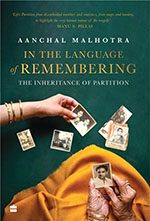The further we get from the events of Partition, the more the art of writing about it changes. Memories fade and change, its custodians no longer those who were direct participants as they have aged. In the Language of Remembering looks at the implications of these flows through a carefully collated selection of interviews both with those who lived through the traumatic events of the mid-20th century in South Asia and their descendants. It builds extensively on Malhotra’s earlier work, Remnants of a Separation, which was published in 2017 to mark the 70th anniversary of Partition, and explored the history of Partition through the ‘material memory’ of the objects refugees carried with them. As Malhotra notes, ‘the received memory of an event is distinct from the participation in and witnessing of that event.’ She goes on to describe how for the ‘children or grandchildren of Partition, the stories of 1947 hardly ever begin to be passed down as a personal history but rather as a story’ (pp. xxiv).
It is the nature of these transformations that sets Malhotra’s work apart from most other examinations of the memories of Partition. Gathering oral histories of Partition is not a new endeavour and has over the years culminated in numerous works that have deeply enriched our understanding of the painful events that marked the balkanization of the subcontinent along religious lines, and the separation and displacement of the communities in the subcontinent. But Malhotra doesn’t just relay those stories. She also looks at how, in their transmission across generations, they have evolved, without diminishing or disparaging those who are often newer repositories of this inherited generational knowledge.

